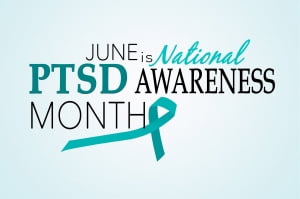 According the American Psychiatric Association, Post-Traumatic Stress Syndrome (PTSD) is a psychiatric disorder that can occur in people who have experienced or witnessed a traumatic event such as a natural disaster, a serious accident, a terrorist act, war/combat, rape or other violent personal assault.
According the American Psychiatric Association, Post-Traumatic Stress Syndrome (PTSD) is a psychiatric disorder that can occur in people who have experienced or witnessed a traumatic event such as a natural disaster, a serious accident, a terrorist act, war/combat, rape or other violent personal assault.
Individuals of all ages can have PTSD and about 8 out of every 100 people (or 8% of the population) will have PTSD at some point in their lives. According to the National Alliance on Mental Health, “about 50% of all people will go through at least one traumatic experience in their lifetime, but not everyone will develop PTSD. In fact, the majority won’t. However, it can be difficult to distinguish between the typical symptoms that follow a traumatic event and when it has reached the point that a condition like PTSD has developed.”
PTSD is historically associated with combat troops and veterans. Recently, PTSD symptoms are being recognized more frequently in other non-military circumstances which is increasing the awareness of this very debilitating condition.
Symptoms of PTSD include and are not limited at least one month of some or all of the following:
- Experiencing unwanted and upsetting memories
- Flashbacks
- Nightmares
- Trauma-related thoughts or feelings
- Decreased interest in activities
- Exaggerated blame of self or others for causing the trauma
- Risky or destructive behavior
- Difficulty concentrating
- Difficulty sleeping
- Irritability or aggression
PTSD can cause severe disruption of normal daily functioning including social, family and work relationships. Being mindful to not minimize this condition, one should be aware of the less obvious reasons why one could possibly be suffering from PTSD i.e. being in or witnessing an abusive relationship, having a miscarriage, being the victim of a significant childhood bullying event or witnessing someone suffer from a seizure or stroke. These are all situations that can cause a person to experience PTSD, but these instances do not always come to mind at first.
If you believe that you or someone you know may be suffering from any type of PTSD, the first action will be to talk a doctor or mental health counselor about symptoms and experiences. PTSD is treatable with trauma-focused psychotherapy. Ignoring the symptoms can lead to depression, anxiety, drug or alcohol use or dependency, eating disorders or suicidal thoughts or actions.
Trauma-focused psychotherapy treatment for PTSD can help by teaching ways to cope symptoms, change thinking patterns, stress management and medication. The treatment of PTSD is not a one-size-fits-all approach, which is why it is important to seek professional help as soon as possible.
For help, contact:
In crisis? call 9-1-1
The National Alliance on Mental Illness: 1-800-950-NAMI
Veterans Crisis Line: 1-800-273-8255 [press 1]
References:
“NAMI.” Home, www.nami.org/Blogs/NAMI-Blog/November-2017/PTSD-and-Trauma-Not-Just-for-Veterans.
“PTSD BASICS.” PTSD, www.ptsd.va.gov/apps/decisionaid/introduction.aspx.
“PTSD BASICS.” PTSD, www.ptsd.va.gov/apps/decisionaid/introduction.aspx.
“What Is Posttraumatic Stress Disorder?” What Is PTSD?, www.psychiatry.org/patients-families/ptsd/what-is-ptsd.
By Chaina Porter, MHC Intern
